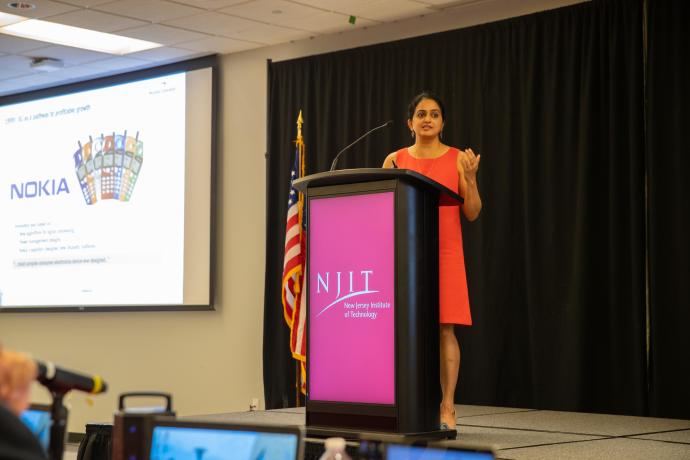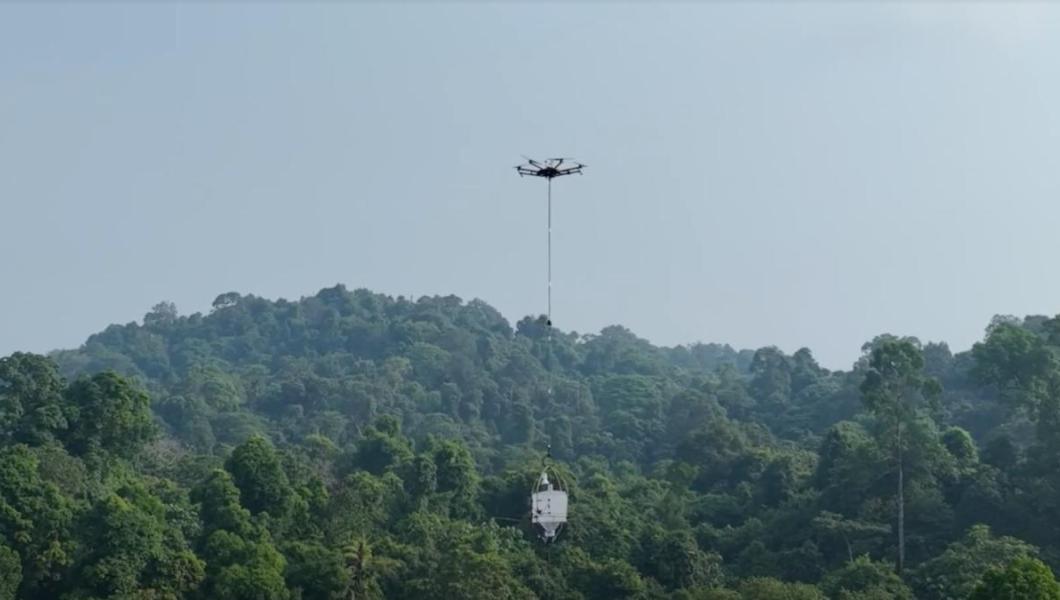From Disease Detection to Criminal Forensics, Student Inventions Energize NJIT's Summer Campus

A rapid point-of-care device with a unique electrode structure designed to identify toxin molecules in human fluids was the winner of the top Dr. James F. Stevenson Innovation Award at the 2022 Undergraduate Summer Research and Innovation (URI) Symposium at NJIT.
Designer Aditi Sathe, a sophomore at Lehigh University, said the goal of her “ESSENCE” device was to “detect and diagnose diseases in minutes,” including at low concentrations. To advance current point-of-care detection capabilities, she incorporated “better electrofield distribution, high shear forces that improve the selectivity of the device, packing that improves the selectivity and a higher frequency to improve the speed of toxin detection.” She tested for mycotoxins, which are produced by molds that grow on food, among other materials, and are linked to both acute and long-term effects.
Sathe, who was advised by chemical and materials engineering Associate Professor Sagnik Basuray and his doctoral student Yu Hsuan Cheng, won $1,000 in the contest. She was one of about 130 students presenting 114 projects in five different areas: bioscience and bioengineering, the environment and sustainability, material science and engineering, data science and management, and robotics and machine intelligence. Each gave a three-minute talk about their inventions.
Kamil Arif*, a rising sophomore majoring in data science at NJIT, won second place ($750) for ForensicXR, a device that scans staged crime scenes into VR applications for forensic science students.
Calling these investigations essential hands-on training for students, Arif noted that “it can be difficult for students to access these staged crime scenes due to a variety of circumstances, such as COVID, tight schedules or long commutes. This is exacerbated by the fact that a lab instructor must be present to run the staged crime scene for the student, and reset the scene after the student is done. With a full class of students, it becomes very difficult to make sure everyone has a chance to investigate the scene.”
The winner of the third-place prize ($500), NJIT mechanical engineering student Richard Daly, developed a system designed to reduce wear-and-tear on gears and springs by using magnetic augmentation to create a near-contactless method of operation. His device improves upon existing methods by reducing the need for expensive materials to resist wear and tear, constant maintenance or replacement and the cyclical application of lubricant, factors which contribute to what the rising sophomore called “a relatively large carbon footprint.”
“Aditi and the other runner-up winners are focused on solving an actual problem/need, and they worked on a solution with real innovation, which has tremendous potential to convert to value creation for a whole range of stakeholders,” said Govi Rao, CEO of Phase Change Solutions, co-chair of the URI external advisory board (EAB) and one of the judges. “All of the winners were extremely passionate about their solution and highly articulate with their presentations. We have to commend their advisors who seemed to have done an excellent job.”
Brian Kiernan, chair of the EAB and an angel investor, said the program must emphasize “engineering and innovation.”
The keynote speaker, Pallavi Madakasira, vice president at Phase Change Solutions (above), instructed students to think deliberately and concretely from the outset about how they will advance their invention outside of the lab.
“You need to have an eye on the future, but plan for the intermediate phase,” she said. “When you’re thinking about balancing it, you want to execute for the next two years, but you do not want to lose sight to what comes in five to six years. It’s a tough job, but it can be done.”
Atam Dhawan, interim provost and the URI program’s founder, pointed to the dramatic growth in the summer research program, noting that in 2015, there were only about 35 participants.
“Undergraduate research and innovation are integrated into the academic experience. This is a top priority. It gives you a significant added value for your resume, your experience, your expertise,” Dhawan said to the students, adding, “A big thank you to the advisors for supervising these wonderful students. I know that you had other choices to spend this summer, but you chose to spend the summer on scientific research, innovation and technology development.”
President Teik Lim called the URI program “one of the crown jewels of this campus.”
“When you make students do research, anything is possible,” he said, adding, “Coming to NJIT is an opportunity of a lifetime. You know why? I choose to come here as your ninth president, because this place is incredibly innovative and entrepreneurial. All of you students make this place innovative and entrepreneurial.”
*Member of the Albert Dorman Honors College


